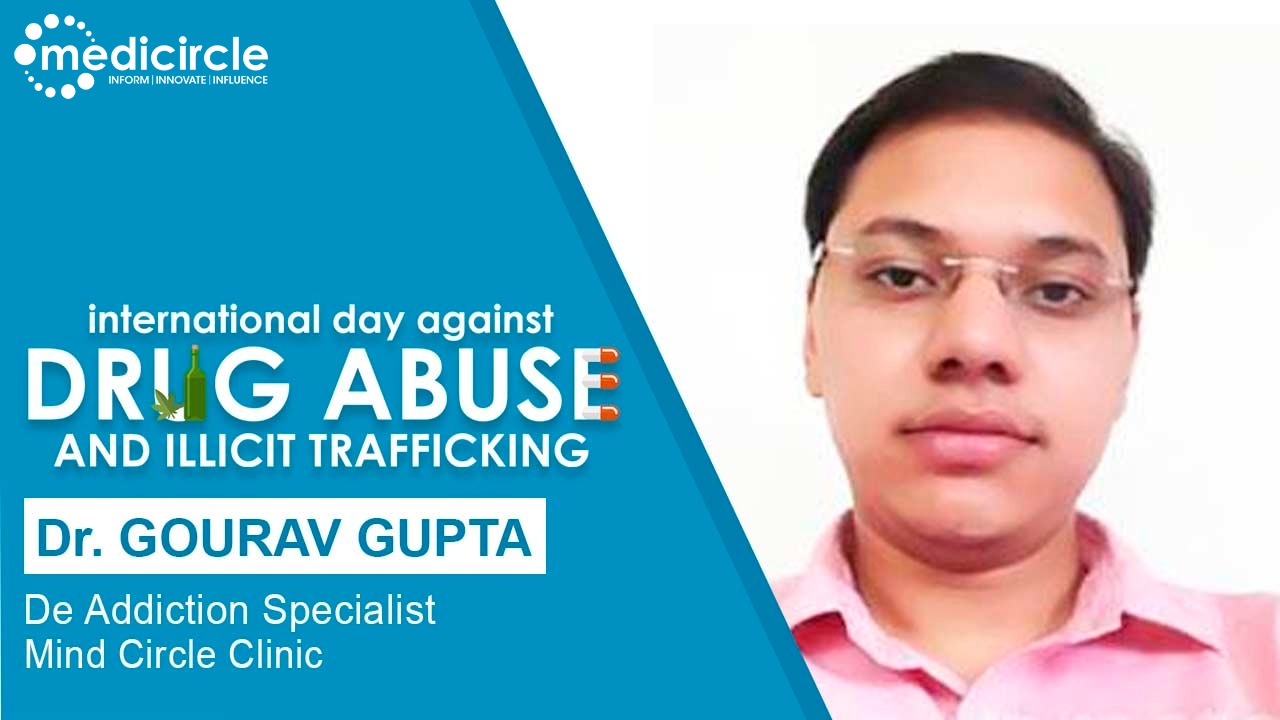International Day against Drug Abuse and Illicit Trafficking falls on June 26 of every year, to bring to light the issues of the seriousness that illicit drugs foster in society. This occasion is upheld by people, networks, and social organizations everywhere in the world. This day is observed worldwide, with much consciousness to make society at large aware of the risks of chronic drug use and illicit trafficking. It's a problem that is a significant obstruction to health and like a poison to the young. We at Medicircle are conducting a series on this International Day against drug abuse and illicit trafficking to make people understand the significance of stopping drug abuse and illicit drug traffic.
Dr. Gourav Gupta is a Psychiatrist at Mind Circle Neuropsychiatry and Drug Deaddiction Clinic in New Delhi. He is an experienced consultant with a demonstrated history of working in the medical practice industry. He has experience in all fields of psychiatry, which include Child and Adolescent Psychiatry, Geriatric Psychiatry, Marital and Psychosexual clinic, Drug addiction, and Community Psychiatry. He has written many articles published in both national and international journals. Also, he has made a valuable contribution in seminars and presentations at national and international conferences.
Addiction depends on the type of drugs
Dr. Gourav speaks, “Time required for becoming addicted varies from person to person and drug to drug. Generally, adolescence is the period when someone is exposed to drugs. During adolescence before 20 years of age, our mind is not that much developed. If someone takes intoxication at a young age like 15 -16, the chances of getting drug addicted are high because taking these drugs causes changes in the brain. So, for anyone likely to take the drug during adolescent age, the chances of becoming a drug addict are higher. Addiction depends upon types of drugs too. For example – smoking causes faster addiction as compared to alcohol. Alcohol induces addiction in 5-6 years whereas smoking induces addiction within 6 months – 2 years. Other drugs like opioids such as heroin develop much faster addiction as compared to alcohol and smoking. Hence addiction also depends on the type of drug.”
All drugs are addictive
Dr. Gourav emphasizes, "All drugs are addictive. There is a myth in the general public that cannabis doesn't cause addiction which is not true. Every drug sooner or later causes addiction.
Drugs and their effects
Dr. Gourav talks, "Every drug has its intoxicating effects like hallucinations, anxiety, delusions. Alcohol causes disinhibition, the person gets involved in risk-taking behavior. Apart from these, drugs do have withdrawal effects like when a person tries to quit drugs, he faces withdrawal effects like anxiety, body pains, and depression. All mental illnesses or disorders like depression, anxiety, OCD, risk of suicide, psychosis are more common in people who are taking drugs.
Medicines for withdrawal symptoms and craving
Dr. Gourav mentions, “There is an effective treatment available for drug abuse. Whenever the drug addiction starts, the patient can consult any Psychiatrist or Psychologist. Treatments are available in the form of medicines and counseling. There are effective medicines available for controlling drug withdrawal symptoms. A patient faces withdrawal symptoms whenever he tries to quit drugs like anxiety, palpitations, and tremors. Medicines are available to control these kinds of symptoms. Likewise, when a patient tries to quit opioids drugs, he faces withdrawal symptoms like severe pain, lacrimation, diarrhea, insomnia. Due to this, patients are unable to quit even if they want. These symptoms are very severe and it’s hard to overcome this. After managing withdrawal symptoms, the second stage is to overcome the craving. Some medicines reduce the cravings of the drug. These medicines ensure that the condition does not relapse.
Other than medicines, patient counseling is very much useful. It is often seen that the family of the patient starts having trust issues, so in this case, family therapy is very much needed.
We also advise family members to change the usual environment that shows positive results.
Family members and drug addiction
Dr. Gourav advises, "The family member should treat this condition as a mental illness that requires treatment. They should understand that the patient's mind is acting differently because these drugs have some serious effects on the brain and it’s hard to quit this addiction over a period of the night.
Effective treatment is available for this condition. They can consult any of the general physicians, experts, psychiatrists, or psychologists for further guidance.
Support is needed from a lot of family members. Family members should constantly build courage, they should keep motivating the patient.
Family members should put in continuous effort. If the condition relapses due to any of the reasons, the family should not stop the process and should understand that it is difficult for them too, and should restart it.
It is very important to understand and listen to the patient. The family should try to communicate more and more.
There should not be critical comments regarding anything from any of the family members.
Follow-up is a must. By any means, if the condition relapses, the family should motivate again to start the withdrawal procedure.
(Edited by Renu Gupta)

 "Time required for becoming an addict varies from person to person and drug to drug. All drugs are addictive. Each drug has its intoxicative effects and withdrawal effects. Medicines are available for their withdrawal effects but family therapy works best to recover from drug addiction" Dr. Gourav Gupta, Psychiatrist
"Time required for becoming an addict varies from person to person and drug to drug. All drugs are addictive. Each drug has its intoxicative effects and withdrawal effects. Medicines are available for their withdrawal effects but family therapy works best to recover from drug addiction" Dr. Gourav Gupta, Psychiatrist







.jpeg)


.jpg)









.jpeg)





.jpg)




.png)



